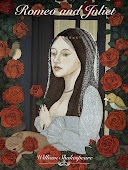ILLUSTRATOR'S DAY // sign up now!!
Thursday, August 25, 2011
Bekir Orhan's Thesis Opening
Saturday, August 13, 2011
'The SCAD exhibitions department presents "Memories in Mother Tongue," a thesis exhibition by M.F.A. illustration student Abubekir Orhan. "Memories in Mother Tongue" is a visual translation of significant experiences the artist has had in relation to his Kurdish identity. The content of this show includes autobiographical elements, the psychological aspect of the artist's experiences, and his personal approach to contemporary Kurdish politics.'
That is the description of the exhibition on SCAD's website. It is accurate, but not adequate to describe the emotional impact of these images.
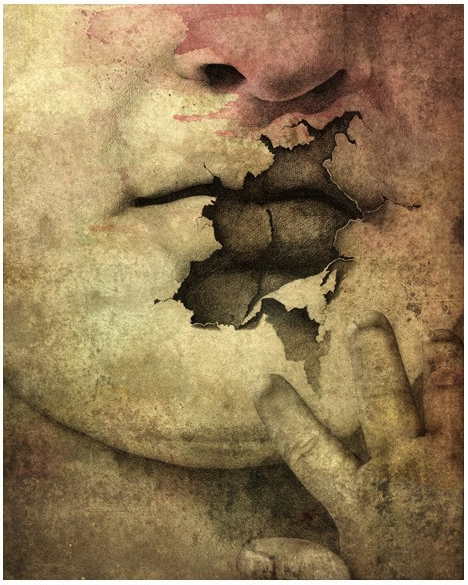
As I understand it (and I am no expert on the Turkish/Kurd relationship), Kurds and Turks have been in various forms of conflict for centuries, but in modern times (since the Ottoman Empire, around WWI), the "Turkification" of the Kurdish population intensified, and most Kurds found themselves being forced to resettle in small pockets scattered across the country, mostly to the East and Southeast. This forced ethnic cleansing split up families, not only physically, but culturally as well. The Kurdish children were forced to abandon their native language and culture in favor of the Turkish language and alphabet, meaning that the adults and their children slowly began to lose the ability to communicate with each other, resulting in a wrenching disconnect between generations.
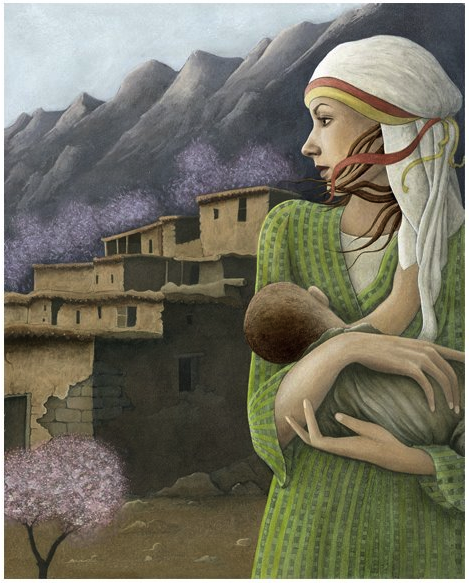
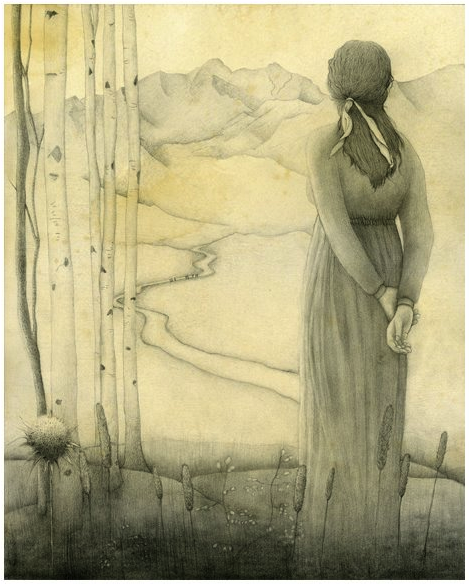
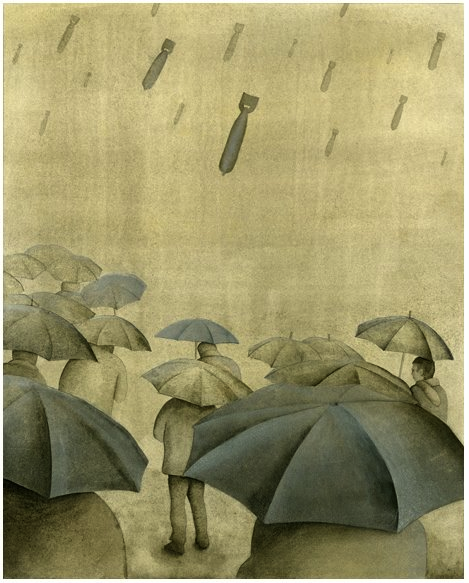
This collection of visual memories of that time and place speak to the loss of one's culture and language, the isolation of having no place that can be called home, and the political tension that permeates every aspect of life as an oppressed minority.
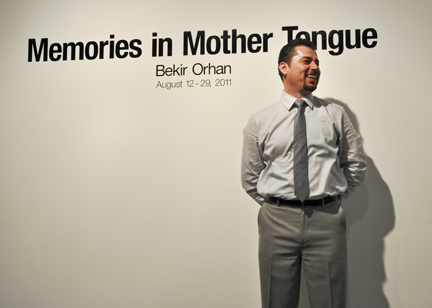
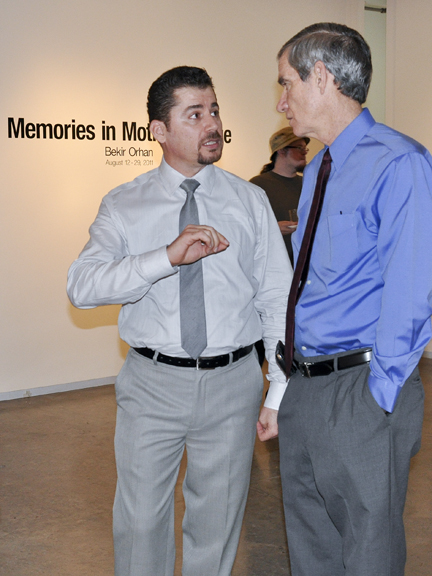
Many thanks to Vice President P.J. Johnson for once again showing his support for all the students at SCAD.
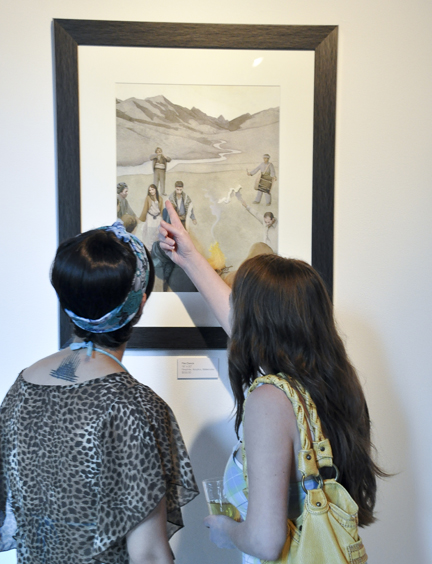
There was a large contingent of fellow SCAD students on hand, as well as friends and family.
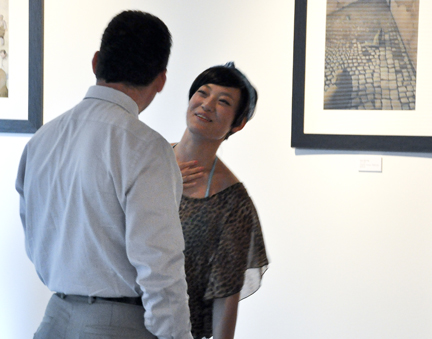
Bekir charming Yina Hyder
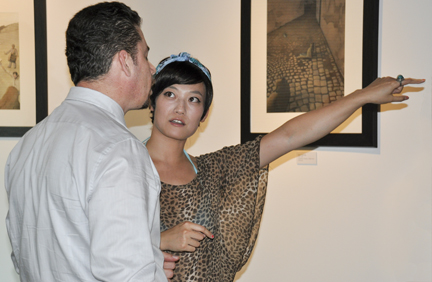
...and Yina telling him where to go, apparently.
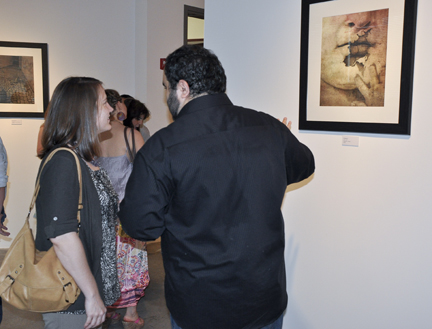
Heather Lund and her boyfriend admiring the work...
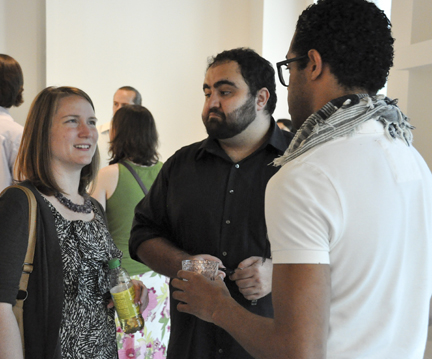
and chatting with Asa Ayers
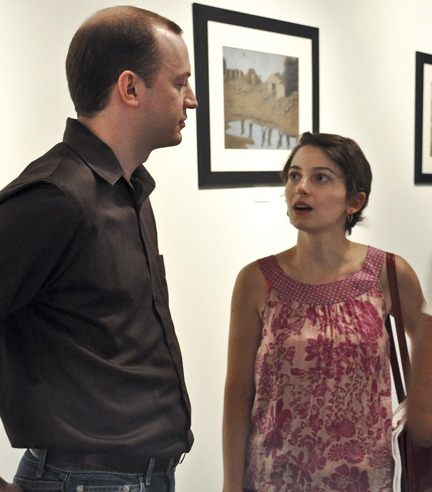
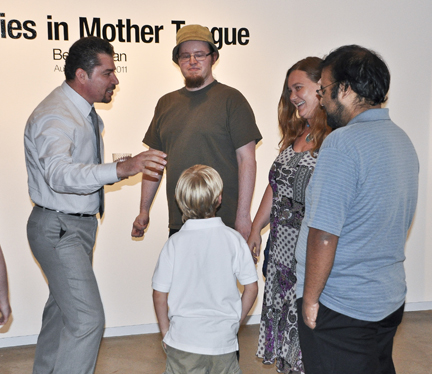
Sean Twiddy, April Dukes and her son and boyfriend.
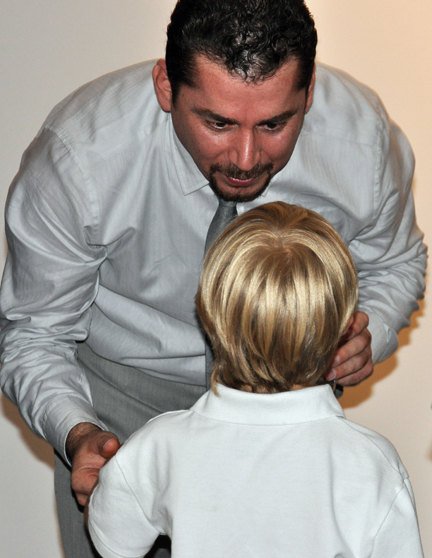
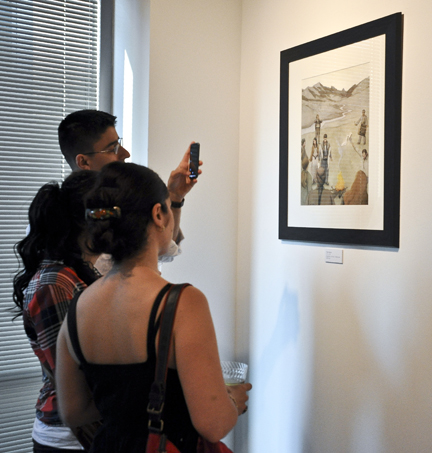
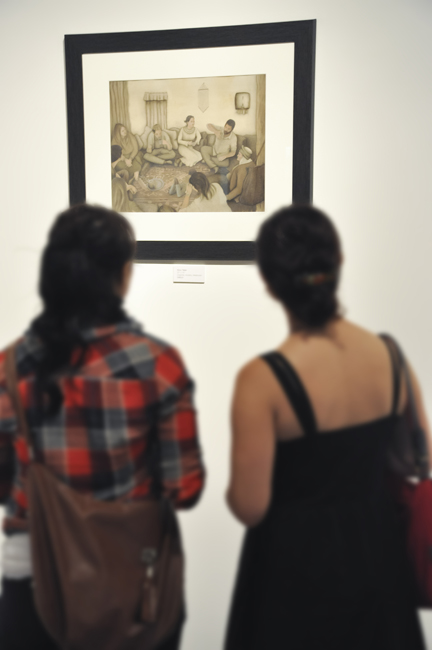
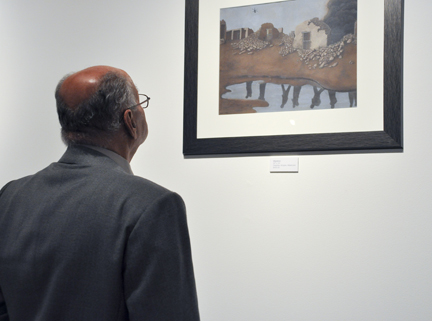
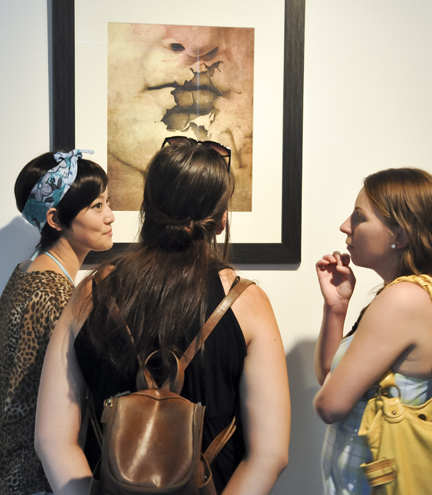
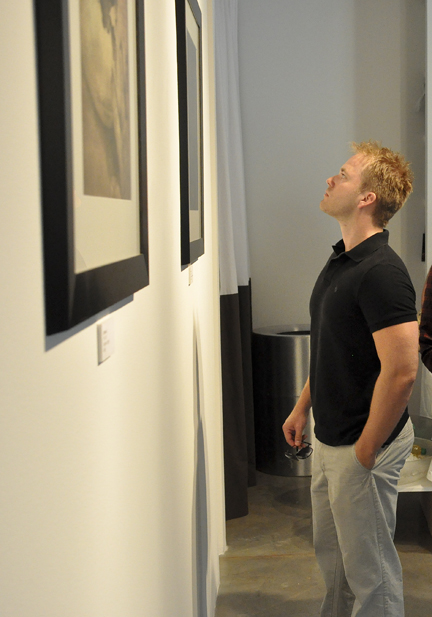
Aaron Jackson admiring Bekir's work.
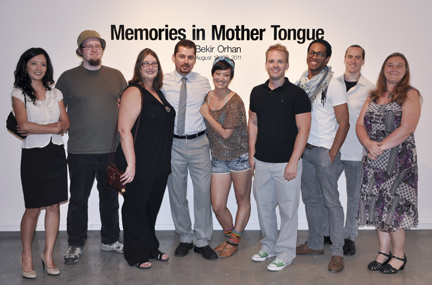
And, fellow SCAD MFA grads and candidates who came to support Bekir...
LtoR: Solongo Monkhooroi, Sean Twiddy, Sandee Chamberlain, Bekir, Yina Hyder, Aaron Jackson, Asa Ayers, Duncan Smith, April Dukes.
Congratulations on a wonderful show, Bekir!
That is the description of the exhibition on SCAD's website. It is accurate, but not adequate to describe the emotional impact of these images.

As I understand it (and I am no expert on the Turkish/Kurd relationship), Kurds and Turks have been in various forms of conflict for centuries, but in modern times (since the Ottoman Empire, around WWI), the "Turkification" of the Kurdish population intensified, and most Kurds found themselves being forced to resettle in small pockets scattered across the country, mostly to the East and Southeast. This forced ethnic cleansing split up families, not only physically, but culturally as well. The Kurdish children were forced to abandon their native language and culture in favor of the Turkish language and alphabet, meaning that the adults and their children slowly began to lose the ability to communicate with each other, resulting in a wrenching disconnect between generations.



This collection of visual memories of that time and place speak to the loss of one's culture and language, the isolation of having no place that can be called home, and the political tension that permeates every aspect of life as an oppressed minority.


Many thanks to Vice President P.J. Johnson for once again showing his support for all the students at SCAD.

There was a large contingent of fellow SCAD students on hand, as well as friends and family.

Bekir charming Yina Hyder

...and Yina telling him where to go, apparently.

Heather Lund and her boyfriend admiring the work...

and chatting with Asa Ayers


Sean Twiddy, April Dukes and her son and boyfriend.






Aaron Jackson admiring Bekir's work.

And, fellow SCAD MFA grads and candidates who came to support Bekir...
LtoR: Solongo Monkhooroi, Sean Twiddy, Sandee Chamberlain, Bekir, Yina Hyder, Aaron Jackson, Asa Ayers, Duncan Smith, April Dukes.
Congratulations on a wonderful show, Bekir!
Hong Kong-Atlanta Dragonboat Festival T-Shirts
Monday, August 8, 2011
We were contacted by Gene Hanratty of the Hong Kong Information Center Atlanta to design the back of the official Hong Kong-Atlanta Dragonboat Festival 2011 T-Shirts.
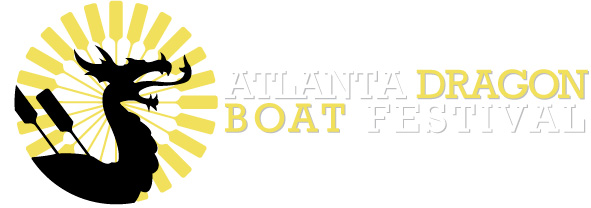
The legend of the festival is quite interesting. The Hong Kong Dragon Boat Festival is undoubtedly one of Hong Kong’s most popular events, drawing thousands of spectators and racing teams from across the globe. The popularity of this event is growing at a surprising rate throughout the world but especially in the USA, Canada and Europe.
Since 1976, when Hong Kong introduced the world’s first international races, dragon boat racing has grown in popularity, with clubs and associations forming in countries throughout Asia, Europe and North America and competitions taking place in cities around the world. The colorful Asian tradition turned exciting international sporting event has attracted quite a following in the United States as well. Moving into its eighth year, the Atlanta event is part of a series of races taking place in major metropolitan areas along the east coast including Boston, Washington, D.C., Philadelphia, and New York.
The sport itself dates back some 2,000 years and has as its origins an ancient Chinese legend. As the story goes, there was a well-loved statesman and poet by the name of Qu Yuan who lived in the Kingdom of Chu during the 4th century B.C. Although this popular figure was a favorite of the people, he found himself banished from the court at the advice of corrupt officials.
Unhappy and in deep despair, Qu Yuan roamed the countryside writing poetry about his love of the country and its people. Unable to bear his sorrow any longer, or perhaps as a final protest against corruption and a plea to the Emperor, Qu Yuan drowned himself in the Mi Lo River.
Local fishermen raced out in their boats in an attempt to save him but arrived too late. In order to lure fish away from the body, they beat the water with their paddles and tossed rice dumplings into the river.
The Chinese people have never forgotten Qu Yuan’s desperate, heroic feat. Thus was born a tradition that continues to this day, dragon boat races are a re-enactment of the failed attempt to save Qu Yuan. The Dragon Boat Festival has deep cultural ties, evidenced by the ceremony and ritual surrounding the races. Four days before a traditional festival, the dragon boats are taken from repose to have their heads and tails attached. Typically, a community leader is invited to “dot the eye” of the dragon in a ceremony designed to rouse its sleeping spirit. While in some cultures the dragon is considered to be evil, in Chinese culture dragons are viewed as strong, powerful and frequently a symbol for the spring rains and growth. Dragons are also viewed as protective and benevolent, which is why dragon boat racing is often thought of as a means of spreading good luck. In return for staging the dragon boat races, it is believed that the community will be blessed with happiness and prosperity.
The dragon boat itself is a spectacle to behold. The slim, 39-foot teakwood racer (and fiberglass models) is crafted today in only a handful of boat-yards in Hong Kong. Distinguished by a fierce-looking dragon’s head at the prow and a tail at the stern, traditional dragon boats require thirty days, three craftsmen, and years of practice to produce.
_____________
The front of the shirts carry the official logo on the breast pocket (shown at the top of this post), so we were charged with creating a design for the back of the shirts. Initially, the shirt could be designed for any of several dozen standard shirt colors, but in the end, we were asked to work with a pale yellow shirt color. Also, since these are screen-printed, we were restricted to three to four colors only.
Rick Lovell's ILLU316: Electronic Illustration II, ILLU730: Computer Illustration, ILLU410: Getting Published, and ILLU764: Illustration for Publications worked on this project.
Asa Ayers' design was chosen as the winner... Congrats Asa!
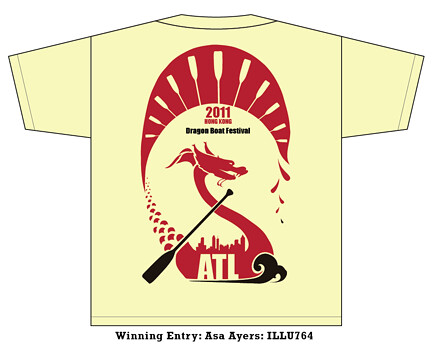
Here are a few more select entries from this year's competition...
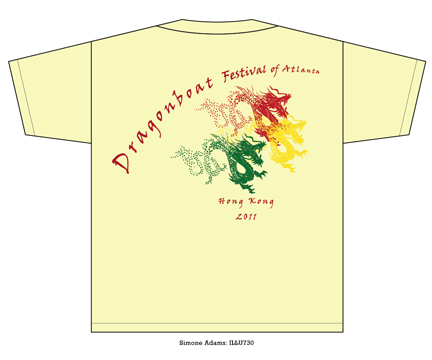
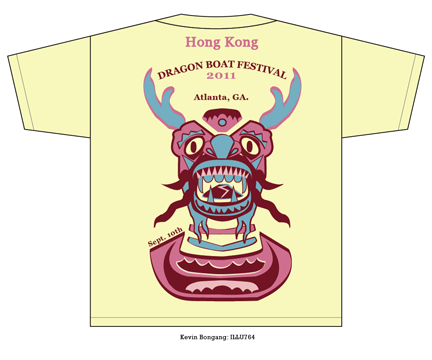
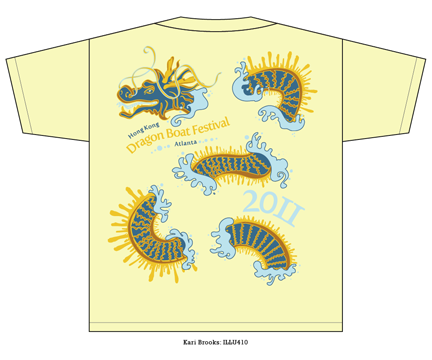
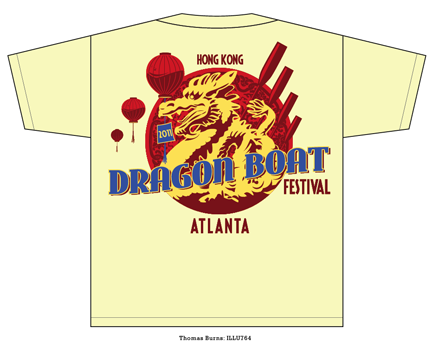
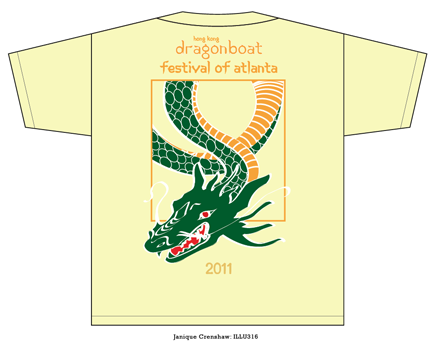
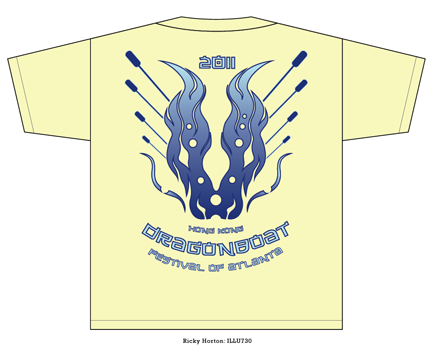
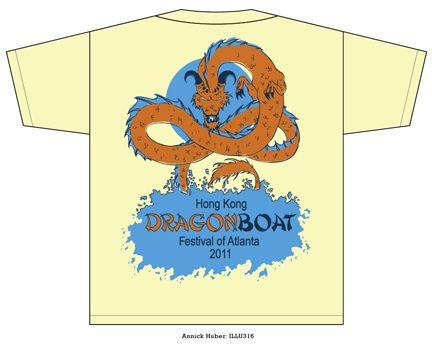
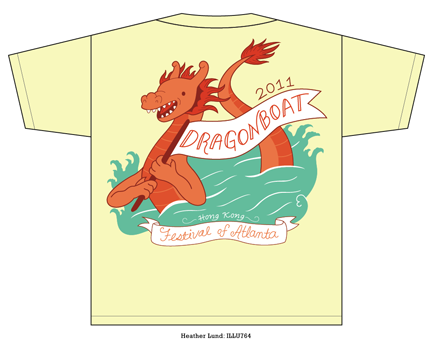
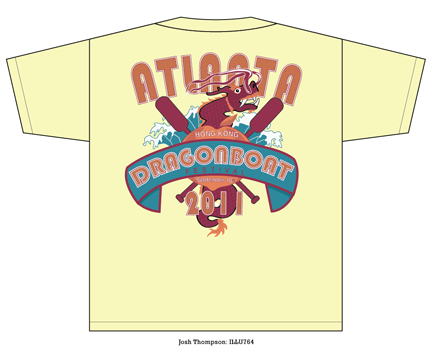
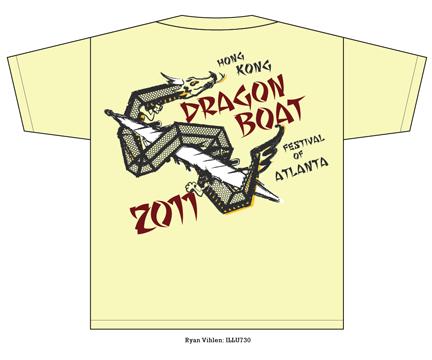
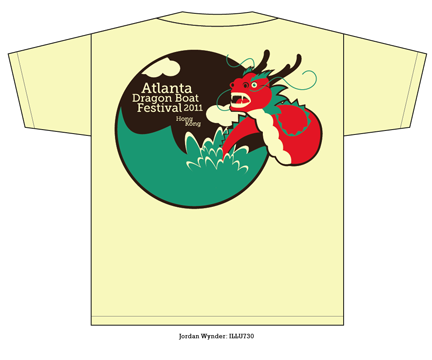
Congratulations to all the students who worked on this project. It was a huge success and was VERY well received by the folks at the Dragonboat Festival. The consensus was that the designs were so strong across the board that judging was quite an ordeal and took much longer than anticipated. They were so impressed that they have asked if we would be interested in making this an ongoing association, and the answer of course, is a resounding YES!

The legend of the festival is quite interesting. The Hong Kong Dragon Boat Festival is undoubtedly one of Hong Kong’s most popular events, drawing thousands of spectators and racing teams from across the globe. The popularity of this event is growing at a surprising rate throughout the world but especially in the USA, Canada and Europe.
Since 1976, when Hong Kong introduced the world’s first international races, dragon boat racing has grown in popularity, with clubs and associations forming in countries throughout Asia, Europe and North America and competitions taking place in cities around the world. The colorful Asian tradition turned exciting international sporting event has attracted quite a following in the United States as well. Moving into its eighth year, the Atlanta event is part of a series of races taking place in major metropolitan areas along the east coast including Boston, Washington, D.C., Philadelphia, and New York.
The sport itself dates back some 2,000 years and has as its origins an ancient Chinese legend. As the story goes, there was a well-loved statesman and poet by the name of Qu Yuan who lived in the Kingdom of Chu during the 4th century B.C. Although this popular figure was a favorite of the people, he found himself banished from the court at the advice of corrupt officials.
Unhappy and in deep despair, Qu Yuan roamed the countryside writing poetry about his love of the country and its people. Unable to bear his sorrow any longer, or perhaps as a final protest against corruption and a plea to the Emperor, Qu Yuan drowned himself in the Mi Lo River.
Local fishermen raced out in their boats in an attempt to save him but arrived too late. In order to lure fish away from the body, they beat the water with their paddles and tossed rice dumplings into the river.
The Chinese people have never forgotten Qu Yuan’s desperate, heroic feat. Thus was born a tradition that continues to this day, dragon boat races are a re-enactment of the failed attempt to save Qu Yuan. The Dragon Boat Festival has deep cultural ties, evidenced by the ceremony and ritual surrounding the races. Four days before a traditional festival, the dragon boats are taken from repose to have their heads and tails attached. Typically, a community leader is invited to “dot the eye” of the dragon in a ceremony designed to rouse its sleeping spirit. While in some cultures the dragon is considered to be evil, in Chinese culture dragons are viewed as strong, powerful and frequently a symbol for the spring rains and growth. Dragons are also viewed as protective and benevolent, which is why dragon boat racing is often thought of as a means of spreading good luck. In return for staging the dragon boat races, it is believed that the community will be blessed with happiness and prosperity.
The dragon boat itself is a spectacle to behold. The slim, 39-foot teakwood racer (and fiberglass models) is crafted today in only a handful of boat-yards in Hong Kong. Distinguished by a fierce-looking dragon’s head at the prow and a tail at the stern, traditional dragon boats require thirty days, three craftsmen, and years of practice to produce.
_____________
The front of the shirts carry the official logo on the breast pocket (shown at the top of this post), so we were charged with creating a design for the back of the shirts. Initially, the shirt could be designed for any of several dozen standard shirt colors, but in the end, we were asked to work with a pale yellow shirt color. Also, since these are screen-printed, we were restricted to three to four colors only.
Rick Lovell's ILLU316: Electronic Illustration II, ILLU730: Computer Illustration, ILLU410: Getting Published, and ILLU764: Illustration for Publications worked on this project.
Asa Ayers' design was chosen as the winner... Congrats Asa!

Here are a few more select entries from this year's competition...











Congratulations to all the students who worked on this project. It was a huge success and was VERY well received by the folks at the Dragonboat Festival. The consensus was that the designs were so strong across the board that judging was quite an ordeal and took much longer than anticipated. They were so impressed that they have asked if we would be interested in making this an ongoing association, and the answer of course, is a resounding YES!
Cirque du Clue; Aaron Jackson's Thesis Show
Saturday, August 6, 2011
Aaron Jackson held his MFA in Illustration Thesis Exhibition at CherryLion Studios; the opening was July 29th. The invitation foretold the theme of the show: "A freaky take on the classic board game reminding you to THINK BEFORE YOU JUDGE".
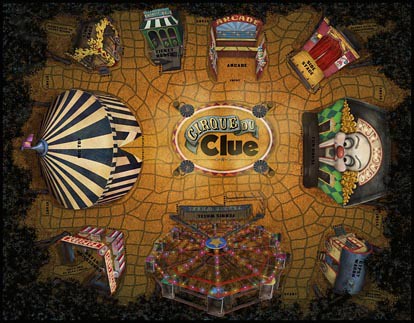
The thrust of Aaron's thesis was to present the idea of tolerance in a familiar, accessible and fun way, so he rethought the classic board game Clue, and changed the setting to a circus side show, populated with all manner of fringe characters. The game board became the circus grounds and the cards represent all the characters, weapons and props that might be associated with the circus.
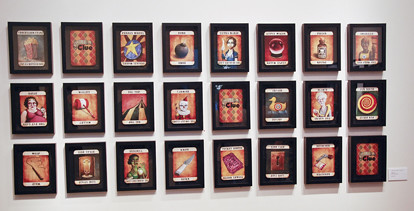
All of the artwork was executed in acrylics, then refined in Photoshop. Each original painting was hung in the show, as were the finished, printed game components.
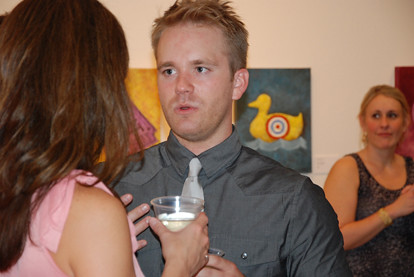
Several old friends and alumni as well as current student were on hand.
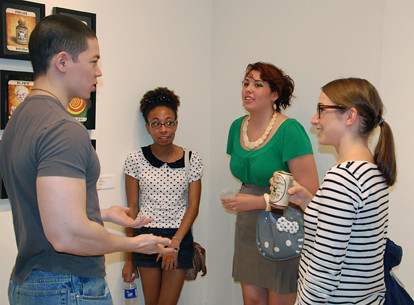
Alan Hawley and Andrea Sipl were there along with one of Andrea's co-workers at Carter's, and Katrin Wiehle came in all the way from Germany just to see Aaron's show! (Not really, but it was great to see her!)
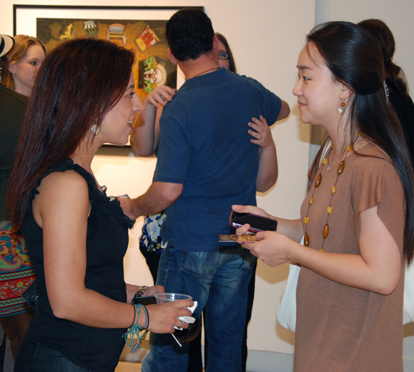
Nazanin Kani and Semin Chun catching up (apparently Obekr and Sandee had some catching up to do as well)
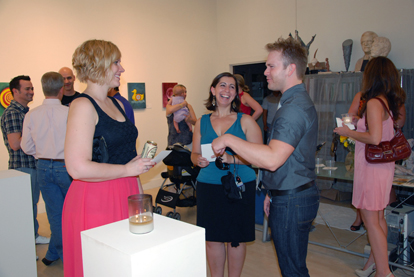
Congratulations, Aaron. It was a great show!

The thrust of Aaron's thesis was to present the idea of tolerance in a familiar, accessible and fun way, so he rethought the classic board game Clue, and changed the setting to a circus side show, populated with all manner of fringe characters. The game board became the circus grounds and the cards represent all the characters, weapons and props that might be associated with the circus.

All of the artwork was executed in acrylics, then refined in Photoshop. Each original painting was hung in the show, as were the finished, printed game components.

Several old friends and alumni as well as current student were on hand.

Alan Hawley and Andrea Sipl were there along with one of Andrea's co-workers at Carter's, and Katrin Wiehle came in all the way from Germany just to see Aaron's show! (Not really, but it was great to see her!)

Nazanin Kani and Semin Chun catching up (apparently Obekr and Sandee had some catching up to do as well)

Congratulations, Aaron. It was a great show!
Subscribe to:
Comments (Atom)



